#parental gaslighting
Text
Heyo guys!
Since my friend made a post about it, I figured I should make a separate post of it as well that could hopefully grab the attention of more of you out there. Especially since it's now not only become a recurrent issue for myself, but millions others like me; whose voices and pleas for help are often met with silence and no aid when it's needed more than ever.
My friend made this with the hopes it would get the attention of a lot of people. And the few that have so far responded, with boosting my signal, it's truly appreciated.
So, I figured I'd best give my story here.
For those who know me, they know that I've been through this before, not that long ago. For those that don't:
This isn't my first rodeo with my dad. This isn't his first offense, and I doubt it'll be his last. But, even my boyfriend commented that it's really like I'm Cinderella.
Which, would make my family Lady Tremaine and her daughters, Anastasia and Drizella.


Surprised?
Yeah, not the most fun people to have in your life as family, let alone be analogous to your own.
But, for at least my brother on the matter, he doesn't mean to intentionally be cruel- if anything, he is just trying to survive from becoming the next target. Which, I get entirely. I oftentimes do the same for when a fight breaks out between my bio father and my stepmom.
But, that's besides the point-- the fact that they are even akin to that family dynamic is absolutely atrocious.
I'm often seen as a black sheep in my nuclear family- a dark horse, a scapegoat, pariah, outcast; hell, I'm almost synonymous to fucking Bruno Madrigal from Encanto, with a little bit of even Luisa for that matter with how bad her anxiety is.


Sure, that sounds pretty awful, but that's like, a surface-level perspective of who I am and what I've been through. And I'm not gonna give you my whole life story here, but, as my grandma would always famously say:

So, here are the said facts (bullets are Bruno related, indents are Cinderella)-
People used to see me as a gifted child when I was little, y'know? Like, my talents had no bounds. My way of being so empathetic and friendly to even the most awkward stranger was renowned by my extended family. I was awkward with communication, and often was very blunt but honest when talking to people, but I was a happy kid. And it's not like I'm not seen for my talents now, but they're brushed to the side more now as an adult because "you can't be living in a fantasy".
Since my dad and stepmom started living together, I've been made to become the maid of the house, doing most chores because the boys won't do it and my stepmom is incapable of handling all the chores and dishes on her own, so she's dumped most things onto me as a "way of covering for part of your rent". Which, I still have to pay upwards of 660-880 a month for. For one small room and a bathroom. For wifi use. And I still have other bills to pay, like for my car, insurance, credit cards, and stuff like that.
It wasn't until I was starting in my teens that my dad saw me very differently. I would often lie to try and keep the peace, because I feared that telling the truth would only hurt everyone more.
I started failing in math; I never got a grade higher than a C-average after sixth grade, because the teacher that year not only made me look like an idiot, but several times painted me as a villain and treated me like I was evil. Simply for standing up for myself amongst a group of classmates who would often bully me
I have little to no privacy in my own room. The only time I do is when I sleep, and that's even temporary at best. My father will routinely inspect my room and if it's not meeting his standards, he has me clean it or threatens kicking me out onto the street because he won't let me live in this house if I can't "do what I am required to do in order to keep living here" shit I wish I actually wish I had recorded him saying fr
He's taken off my door several times in the past as a punishment for not "adhering to his rules"- not okay as a teenager, even more not okay as a fucking twenty-four year old adult
(literal screenshots from conversations with my dad below)

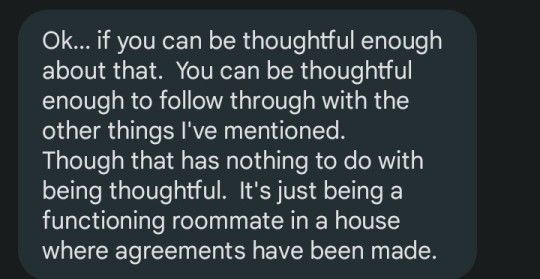
My bio dad started seeing me less as an honest and good person, because during my sixth grade years and beyond I'd struggle with being honest with myself, let alone my parents, about my personal and educational issues.
I've had to be the one to call out when things aren't right, and be shut down for it. I've been the one to call out my family's bullshit, only to get side-swept with the realization my perception of how they treat me is cuz they do believe something is inherently wrong with me for retaliating.
I'm often accused of mishearing things- like, my parents will say one thing, and then the next day, or weeks or months later, when I repeat that statement, they go and say "Oh, I never said that."
I've walked out of my parents' lives once. It only lasted two weeks, but I did have to take a step back from it all. Because I could see what it was doing to everyone in my family. And I love my family, despite their shit. But that doesn't mean I'm not gonna walk out again- in fact, I'm working on a way to do so.
I relate more to pets and small children and even teens than I do older people.
I still have anxieties and fears over my talents and what I'm capable of, thinking I'm not good enough or that it's just the same old thing. The difference is I know it's not, and I know I'm worth more than this.
I have always liked the color green, and it was always a more mysterious color more than an evil or menacing color.
I often have had foresight of future events and get deja by when they do happen. Though, other times I just notice things going awry and I try to warn others of like, a possibility that they don't want to accept.
I lost friends and people who I actually enjoyed being around because of how I was growing up, and it was until I became an adult that part of it wasn't even my fault. A lot of the kids noticed my parents and didn't want to be around that kind of behavior with adults, because they could sense what I couldn't at the time, which was that my parents' behavior towards me was absolutely uncalled for, and rather controlling.

I was only recently properly diagnosed with Autistic Spectrum Disorder and ADHD; but before then, as an adult, I had more difficulty talking. Difficulty expressing how I felt. Trouble with finances. Being in the right headspace. Being able to take a step back and be like "whoa, now hold on- pointing fingers at me is only going to point three right back at you, let's not assume shit here". And it took a lot of support from my support systems and my boyfriend- @constant-state-of-self-discovery - to get a truly more accurate diagnosis. Cuz I've had three different diagnoses over the years, with the third being my most accurate one but I digress
I have echolalia and repeat funny phrases, hum music, etc.
When my brother was born - and I hate to use this comparison, but - almost immediately he became the Golden Child of the family dynamic. I was ten when he was born- and yeah, that's unfair for a baby, toddler, and little kid. But flash forward to when he's a bigger kid, when he's in his pre-teen stage and now a fourteen year old, who's gotten more educational advantages than I was ever offered or even given when asked. Who has had more positive experiences with his parents than I ever did. Who got the chance to actually go to the highschool he wanted to without having to worry about who I was really zoned for. Who is getting to work on his passion and talents. Yeah, that's totally not favoritism there.
I draw. I write. I legitimately can see myself voice acting one day.
I have often proved my family members both right and wrong about things in their lives, but I'm still the bad guy. Interesting how that works.
--------
See, these are the facts that just have me relating to just Bruno and Cinderella alone, with how my life is. There's plenty of other shit to add on about my stuff, but that's enough dirty laundry to get the ball rolling.
The fact of the matter is this: I cannot live in such a place like this anymore. And if anyone can help, I'd seriously appreciate whatever cash, boosting, reblogging, sharing that can be done.
I'm tired of living a life like this. I want to move forward. I want to start my next chapter, away from abuse.
And I'm really hopeful for the first time ever that something good might come out of this.
(thank you @savythenillerwaffer , @nystiaa , @oswinunknown , and @anne-of-crows for reblogging along with the others who have spread the word.)
#narcissist parents#narcissistic father#parental gaslighting#parental abuse#family#scapegoat#black sheep#golden child#domestic abuse#Cinderella#bruno magridal#spilling the tea#call out post#receipts#my screenshots#shut up kido#please boost#asd#autistic spectrum disorder#adhd#audhd
21 notes
·
View notes
Text

#coqette#lana del rey#hell is a teenage girl#girl interupted syndrome#mitski#delulu#delusional#this is a girlblog#gaslight gatekeep girlboss#vent#girlblogger#femcel#pink#lana del ray aka lizzy grant#it girl#parental issues#this is what makes us girls#female hysteria#jennifers body
4K notes
·
View notes
Text
Survival 101 :
Buckle up your seatbelt darling because this is going to be triggering and one hell of a ride. Don't expect mushy from me. Might do it when tapped in my soft girl era but today I feel like a Villain.
1) Keep your mouth shut where you don't hold the power. No power no expressed opinions that can put you in trouble.
2) Learn manipulation and seduction skills. This will help you to detect when someone is trying to manipulate and seduce you. Saves a lot of drama and heartache.
3) Fight back strategically. We don't want to lose a job, a degree certificate, a bruise on your body,etc depending on your situation.
4) Facts over emotions. Always.
5) 90% of older men are creepy. Speaking from experience here. Play with them by ear. Get what you want by being polite and respectful but if they try to harass you or take advantage we turn Medusa on them or if you are not in a position to fight and walk out safe just play cutesy and shy and dumb. Ask him what he means and do not take a word said by him seriously. Dodge his advances like your life depends on it until you get an opening to run for the hills.
6) Snap out of delusions and pay attention to reality. People are not what you make them out to be they are what they show you. Stop making excuses for them.
7) Anxiety can be crippling. Panic attacks are the worst but no matter what happens try your level best to never show them publicly. Men are vultures and vulnerable women are easy prey for men.
8) That one friend who is all sweet to you and is your bff but anything positive happens in your life and suddenly starts becoming passive aggressive. Not your friend. Don't share any secrets. Best to be kept as an acquaintance.
9) Develop sarcasm and don't be afraid to put self entitled bitches and bastards in their place. Better being called a 'Mean Girl' over a 'Doormat'.
10) Bully back the bullies. It's 2024 sweetie we don't wait for an opportunity for revenge we fucking create it.
11) No matter how tough your life is going everyone shouldn't be getting a broadcast about it. At least not by your own mouth. Try to act as put together as you can.
12) Kindness is virtue but being apathetic saves you. Don't be the fool who bleeds through the stabs of the same knives again and again. "Because I can't see them in pain. I have a heart." Babygirl you have a life too. All that emotional stress is going to result in some serious problems in the upcoming years.
13) Learn when to quit. The most emotionally intelligent people I know are great quitters. They know when it's the end of an era.
14) Never disclose your family issues to outsiders. Until and unless a person has proved their loyalty to you year after year only those selected one or two people should know your domestic issues. Anyone else knowing it is like having a good gossip for tea time.
15) Lastly, there are no fucking saviours in real life. You are your own saviour.
#dark feminine energy#divine feminine#gaslight gatekeep girlboss#girlblogging#glow up#it girl#self care#self love#that girl#toxic parents#toxic people#trauma survivor#survival#it girl aesthetic#that girl aesthetic#becoming that girl#becoming her#wellness#mental health#motivation#girl blogger#self help#self improvement#dark femininity#pink pilates girl#pink pilates princess#ash-says#coquette#level up#level up journey
1K notes
·
View notes
Text
DC x DP Fic idea: The Royal Consort
Wesley Weston runs a blog after getting over his desire to expose Danny's secret- primarily due to no one believing him- and no one pays attention to it since almost all of Casper high school has one too.
The difference between the hundreds of other blogs is that one of his pictures of Phantom is clear. A perfectly uncorrected image of the famous ghost, whereas nearly all other pictures are blurry due to ghosts disrupting cameras. Even Wes isn't sure how he managed to capture him so well.
Another difference between his blog and others is that one of his followers happens to be John Constantine, who followed the kid a long time ago due to the fanfiction of the Bats and found them hilarious.
John opens his phone app, expecting a new chapter to the Bruce Wayne/Superman fic, and spits out his tea upon seeing the High King of the Dead casually in the human world. Horrified that the King has not been appropriately welcomed- which could lead to a war that the humans would never win- he calls an emergency Justice League and Justice League Dark meeting.
It didn't help that they had allowed a county to pass the anti-ecto laws, which ruined any attempt to appease the Ghost King once the news broke to the public. The League still worried about a declaration of war even after they demolished the laws and the United Nations had the States apologize on humans' behalf.
They quickly discover High King Phantom has been visiting Earth for almost three years. Before his coronation, Phantom had not been outside the Infinite Realms very often though he has appeared throughout history. Cave drawings date back thousands of years before the first ancient Egyptians, but he's visits are few and short.
Life would naturally send him back to the Realms because he had too much power and ectoplasm. After taking the throne, his powers only grew, which meant someone had to summon him as the only way for him to stay on Earth longer than an hour.
Now as King, he appeared only within the small town of Amity Park daily. Why?
John sighs. "He has an anchor. Someone is tying him to this plane. Like the helmet for Nabu, which allows Doctor Fate to exist here without being launched back to the Infinite Releams, Phantom has bonded himself. And I know who that is"
He pulls up a class photo on Weston's blog and points to a boy wearing a particular necklace.
"Danny Fenton is wearing the official Royal Consort of the Infinite Realms symbol and has been since he was fourteen. Phantom's husband may be our only hope to salvage the terrible mess the USA's bloody GIW placed the rest of us in."
Danny loved the necklace he found in Pariah Dark's old haunt. He inherited Pariah's haunt and everything inside once he was crowned and hasn't taken it off since. He didn't think it would be an issue. It's not like it would out his secret to his parents or anyone else since it was in Ghost Speech. Even he didn't know what it said.
Then one morning he comes down for breakfast only to have the most important members of the Justice League sitting in his living room waiting to greet him.
Desperate to keep his halfa status a secret, Danny must convince the entire world watching him, that he's just a human who scandalously eloped at age fourteen with one of the strongest beings in the mulitverse.
Jack's horrified "We were shooting my son-in-law this whole time" became a meme that has trended for months.
( Part 2 )
#dc x dp#dc x dp crossover#Danny is girlboss gaslight his way through this#his parents knew he was bi but married!?#The Royal Consort
4K notes
·
View notes
Text
“I love you” until my daddy issues scare you away
#lena writes#coquette#coquette aesthetic#girlblogging#hell is a teenage girl#this is what makes us girls#whisper girl#coqeutte#femcel#gatekeep gaslight girlboss#just girly things#daddy issues#mommy issues#dilfism#older man younger woman#obviously doctor you've never been a 13 year old girl#older men <3#alana champion#i’m going insane#female insanity#female hysteria#im just a girl#lana is god#sparkle jump rope queen#i hate it here#toxic family#toxic father#sullen girl#toxic parents#age g4p
378 notes
·
View notes
Text
how i feel after using all of the water in my house for my everything shower

#just did this#my parents love me fr 😍#girlblogging#wonyoungism#thoughts ✍️💕#pink pilates princess#it girl#self care#female hysteria#girlhood#hyperfemininity#im just a girl#girly thoughts#girl blogging#gaslight gatekeep girlblog
162 notes
·
View notes
Text
This is why I hate it when MRAs whine about the courts “favoring” the mothers
How the 'junk science' of parental alienation infiltrated American family courts and allowed accused child abusers to win custody of their kids.
This story was reported in partnership with the nonprofit newsroom Type Investigations.
In the summer of 2020, when he was 12, the boy told his therapist something he'd never told anyone else.
For years, Robert claimed, his stepdad had sexually abused him.
The therapist alerted the San Diego County child welfare agency, which launched an investigation. The county sheriff opened an inquiry, too. Thomas Winenger, the only father figure Robert had ever known, began assaulting him when he was only 7, Robert told a forensic social worker in October 2020. Winenger would pin him down, cover his mouth, and force him into acts he found "disgusting," he said. Sometimes, he said, Winenger recited Bible verses during the attacks, claiming the devil was in Robert's heart.
Robert, whom Insider is identifying by only his middle name, said that as he struggled to breathe, he fought back by hitting, punching, and kneeing his stepfather. But he said Winenger overpowered him.
By the time Robert came forward, Winenger had been named his legal father and was divorced from Robert's mother, Jill Montes, with whom he also shared two young daughters. Robert confronted Winenger with the allegations that November, and within weeks Winenger denied the claims in family court. "This NEVER HAPPENED," he asserted in a filing.
He offered an alternative explanation for Robert's disturbing claims, one that shifted the blame to Robert's mother.
Montes, Winenger contended, had engaged in a pattern of manipulation known as "parental alienation." Robert's accusations weren't evidence that he'd abused the boy, Winenger claimed. They were evidence that Montes had poisoned the children against him. The delayed timing of Robert's allegations, Winenger argued, only made them more suspicious. Montes was causing the children such grave psychological harm, he claimed in the filing, that the children should be transferred to his custody right away.
That December, Child Welfare Services substantiated Robert's allegations, calling them "credible, clear, and concise." But the family-court judge, Commissioner Patti Ratekin, withheld judgment until the following October, when the psychologist she'd appointed as a custody evaluator submitted his own report.
That report, which has been sealed by the court, appears to have convinced Ratekin that Winenger was correct.
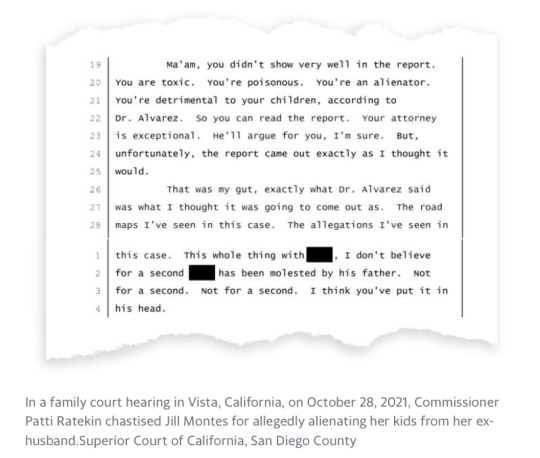
“Ma'am, you didn't show very well in the report. You are toxic. You're poisonous. You're an alienator," Ratekin told Montes at a hearing on October 28, 2021. "I don't believe for a second" that Robert's father molested him. "Not for a second," she repeated. "I think you've put it in his head."
Ratekin acted swiftly, granting Winenger's bid for custody and ordering him to enroll Robert and his sisters in Family Bridges, a program that claims to help "alienated" children reconnect with a parent they've rejected. She barred Montes, a stay-at-home mom and home schooler, from all contact with her children for at least 90 days, a standard prerequisite for admission to the program.
"I just wanted to crumble," Montes said.
Rejected as a psychiatric disorder
Parental alienation is a fairly recent idea, conceived in the 1980s by a psychiatrist, Dr. Richard Gardner, who argued that divorcing mothers, desperate to win custody suits, were brainwashing children against their fathers. In "severe" cases, Gardner wrote, children with "parental alienation syndrome" must be removed from their mothers, transferred to the care of their fathers, and reeducated through what he called "threat therapy."
Alienation has never been accepted as a psychiatric disorder by the medical establishment. Yet today, mental-health practitioners across the United States assess and treat it, particularly those who specialize in custody cases. Many of them collaborate closely, attending the same conferences, following the same protocols, and citing the same papers. Some run reunification programs like Family Bridges; others offer family therapy or produce custody evaluations for family courts.
Influenced by these experts, many judges have given the unproven concept the force of law.
Though most custody cases settle out of court, in a small fraction parents don't come to terms. In some of these contested cases, one parent accuses the other of alienating the children. The most intense disputes arise in cases where one parent alleges spousal or child abuse and the other responds with a claim of alienation.
But alienation claims are highly gendered. Men level the accusation against women nearly six times as often as women level it against men, one study suggests. That landmark study, published in 2020, found that in cases when mothers alleged abuse and fathers responded by claiming alienation, the mothers stood a startlingly high chance of losing custody.
Occasionally, parents accused of alienation are cut off from their children altogether. Since 2000, judges have sent at least 600 children to reunification programs that recommend the temporary exile of the trusted parent, a collaborative investigation by Insider and Type Investigations revealed. While the programs suggest a "no-contact period" of 90 days, this term is routinely extended and may last years, according to an analysis of tens of thousands of pages of court papers and program records.
The treatment typically starts with a four-day workshop for children and the parent they've rejected; aftercare can add months or years. Children may be seized for the workshop by force, with no opportunity for goodbyes.
Former participants at Family Bridges and a similar program, Turning Points for Families, said they were taught that their memories were unreliable, the parent they preferred was harmful, and the parent they'd rejected was loving and safe. In some cases, participants who resisted these lessons said they were verbally threatened; at Family Bridges, a few were threatened with institutionalization. Some participants said they ended up depressed and suicidal.
Program officials say they are helping children. Lynn Steinberg, a therapist who runs a program called One Family at a Time, said in an interview that virtually all the kids she's enrolled have falsely accused a parent of abuse and that she does not accept children into her program whose abuse claims have been substantiated. Without treatment, she said, alienated children would risk being plagued by guilt, and the relationship they wrongly spurned might never heal.
In Steinberg's view, the only child abusers in the families she sees are the "alienators," who have "annihilated" a devoted parent from their children's lives.
Recently, alienation theory has faced rising criticism. Efforts to legitimize the diagnosis have been rebuffed by the American Psychiatric Association, the World Health Organization, and the American Professional Society on the Abuse of Children. And the reunification programs burst into public view last fall, when a video documented two terrified children in Santa Cruz, California, being seized for One Family at a Time. In the clip, which went viral on TikTok, a 15-year-old girl named Maya pleads and shrieks as she's picked up by the arms and legs and forced into a black SUV.
Since then, bills that would restrict reunification programs have been introduced in Sacramento and four other state capitols.
An idea takes off
When a law professor named Joan Meier founded a nonprofit to help victims of domestic violence two decades ago, she didn't expect to focus on custody disputes. But day after day, she heard from mothers with similar, troubling stories. They'd finally escaped their abusive marriages, but their exes had fought them for custody — and won. The mothers had been accused of something Meier knew little about: parental alienation.
Meier, who taught at George Washington University, ordered a stack of books by the child psychiatrist who coined the term.
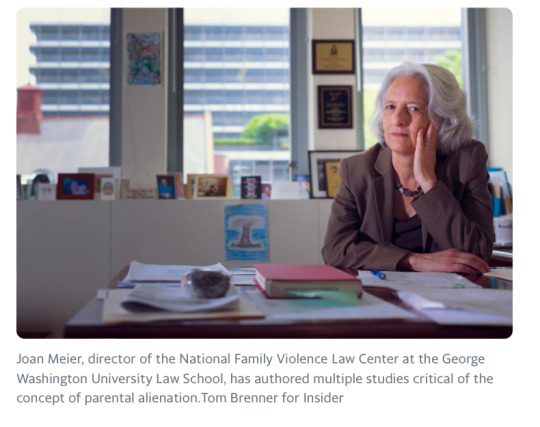
Richard Gardner began writing about children of divorce in the 1970s, when a dramatic transformation was underway in family court. Under the "tender years presumption," judges had long favored women in divorce cases, typically assigning children to their mother's sole custody. But as more women entered the workforce, more men participated in child-rearing, and more couples divorced, a nascent "fathers' rights" movement emerged, demanding gender neutrality in custody proceedings. The idea appealed to many feminists, too. By the 1980s, most states had recognized joint custody in their statutes.
This left judges in a quandary when couples failed to settle. Now, aside from a vague mandate to advance the "best interest" of children, courts lacked a clear paradigm for resolving disputes. Overwhelmed, judges turned to mental-health professionals, asking them to assess each parent's fitness and recommend an optimal arrangement. Gardner, then an associate clinical professor of child psychiatry at Columbia University, was an early custody evaluator, and in 1982 he published a how-to manual.
By 1985, Gardner was arguing that some mothers, seeking to regain their advantage in court, were inducing a mental illness in their children, a condition he dubbed parental alienation syndrome. Children afflicted with the syndrome, he said, could be identified by the "campaign of denigration" they waged against their fathers, which was accompanied by "weak, frivolous, or absurd" rationalizations and a disquieting "lack of ambivalence."
Some "fanatic" mothers even manipulated children into claiming their fathers had sexually abused them, Gardner contended. When other maneuvers against a father fail, he wrote, "the sex-abuse accusation emerges as a final attempt to remove him entirely from the children's lives." Child sexual-abuse claims made during custody disputes, he claimed, "have a high likelihood of being false." To prove children are suggestible, he often invoked the wave of 1980s cases in which preschool teachers were charged with sexual abuse but later exonerated.
Gardner's theory sidestepped what Joan Meier saw as a glaring truth: Many children accused their fathers of abuse because their fathers were actually abusive. In fact, by the early 2000s a large-scale study had found that contrary to Gardner's writings, neither children nor mothers were likely to fabricate claims during custody disputes.
The remedies Gardner proposed for parental alienation syndrome were harsh. "Insight, tenderness, sympathy, empathy have no place in the treatment of PAS," he said in a 1998 address. "Here you need a therapist who is hard-nosed, who is comfortable with authoritarian, dictatorial procedures."
In a 2001 documentary, Gardner told a journalist how a mother might respond to a child reporting sexual abuse: "I don't believe you. I'm going to beat you for saying it. Don't you ever talk that way again about your father."
Juvenile detention could cure children who refused to visit their fathers, Gardner said. But the main remedy he advanced in severe cases was "the removal of the children from the mother's home and placement in the home of the father, the allegedly-hated parent." This would break what he called a "sick psychological bond."
After introducing his theory, Gardner began using it in expert testimony and promoting it to other evaluators and fathers'-rights activists. By the early 2000s, family-court judges were regularly citing parental alienation.
To address this, Meier said, she undertook a series of academic articles examining the scholarship on parental alienation. She found that the theory was based on circular reasoning and anchored almost entirely in anecdotal data.
"I still believed in that day that if you did careful, thoughtful analytic scholarship, people would read it and be persuaded by it," she said.
The scarlet 'A'
Jill Montes had always wanted a big family. In 2008, she already had a 5-year-old daughter, Paige, with a man she'd divorced, and she was finding regular work as an actor in Los Angeles. She decided to adopt an infant son, Robert.
The next year, she met Thomas Winenger, who had master's degrees in engineering and business, on eHarmony. "He wanted to talk a lot about faith and God, and that wooed me," she said. She also welcomed his interest in Robert, whom she was insecure about raising alone.

In 2011, the couple married and settled near San Diego, and Montes quit acting. Soon, she later said in a court filing, Winenger was shoving, insulting, and threatening her, often in front of the kids. He promised to change, and she hoped he could. In 2012, their first child, Claire, was born, and Eden followed in 2015. Insider is identifying Montes' children by only their middle names.
Later that year, Montes accused Winenger of dragging Paige across a room. Montes sought a restraining order, which was ultimately denied, and kicked him out. He rented a room in a house nearby, where he regularly hosted the three younger kids. Sometimes, Robert went there by himself.
Montes filed for divorce in February 2018. Under an informal agreement, the kids continued spending time at Winenger's place. But at a hearing that fall, a 10-year-old Robert testified that during an argument over his math homework, Winenger had repeatedly grabbed, shoved, and spanked him.
Montes filed a petition for a domestic-violence restraining order, which Winenger fought, saying he hadn't mistreated Robert. In the end, Ratekin, the judge presiding over the divorce, signed a "stay away" order prohibiting Winenger from contact with Robert. But it didn't address the allegation of violence. Weeks later, Winenger asked Ratekin to name him Robert's legal father, arguing that he'd helped raise the boy from toddlerhood. Ratekin ruled in his favor and ordered the custody evaluation.
In court papers he filed on July 19, 2019, the day after the evaluator was appointed, Winenger accused Montes of parental alienation.
Often, according to Meier, the dynamic of a custody case shifts radically once alienation is raised. "It's like the table turns 180 degrees and now the only bad parent in the room is the alleged alienator," she said. An abuse allegation "fades out of view," she said, and any attempts by the mother to limit the father's access are seen as suspicious. It's almost as if, like Hester Prynne in "The Scarlet Letter," she's been branded with a flaming red "A," Meier said.
Indeed, Montes soon lost ground in court.
In January 2020, Ratekin ordered Robert into the care of a therapist, Mitra Sarkhosh, who has since provided aftercare for at least one reunification program. Sarkhosh saw Robert and his father together about 20 times, charging $200 an hour. But by summer, she had halted the sessions, saying Robert's anger was "not improving."
In a report filed in court, Sarkhosh appeared to blame Montes. Living with her, Robert was "saturated with negativity about his father," she wrote. There may be a need for "new interventions." (Citing patient-confidentiality laws, Sarkhosh declined an interview request.)
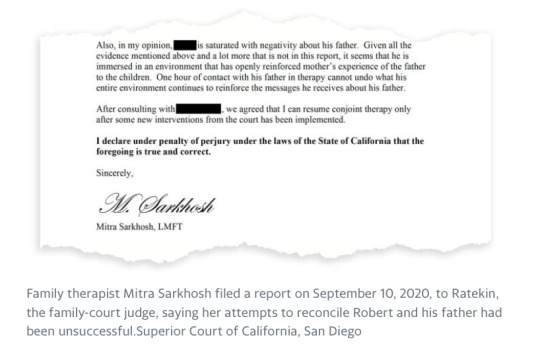
Robert was relieved to be finished with Sarkhosh, Montes said. He started seeing a new therapist, and, during the first session, he told the therapist he'd been sexually abused.
On November 18, 2020, at the direction of the San Diego County Sheriff's Department, Robert called Winenger to try to elicit a confession. When that failed, the department paused its investigation, but the child welfare inquiry proceeded. On December 1, the California Health and Welfare Agency issued a report substantiating Robert's claims.
"The Agency is worried that if given the opportunity, Tom Winenger will sexually abuse [Robert] again," the report says.
Neither Winenger nor his divorce attorney, Tamatha Clemens, responded to requests for interviews or to a list of detailed questions. In a motion for custody he filed on December 8, 2020, Winenger argued that Robert's allegations had been "orchestrated" by Montes and that her alienation "will not stop until she is restrained by the court."
The welfare agency sent Ratekin its report on January 4, 2021, according to a cover sheet reviewed by Insider. But Ratekin was still awaiting the custody evaluation, which she'd assigned to a psychologist, Miguel Alvarez. In 2009, Alvarez coauthored a handbook for parents in custody disputes. While the manual spells out in detail how to prove an alienation claim, it offers no specific guidance on how to prove a claim of abuse.
According to the report, part of which Insider reviewed at a San Diego County courthouse, a personality test Alvarez administered suggested that Montes suffered from "extreme hyper-vigilance" and "persecutory fears." People with these traits, Alvarez wrote, "are often quick to anger and overreact to perceived or imagined threats."
Winenger's scores on the same test were "normal," Alvarez wrote, and his performance on psychosexual and polygraph tests was "inconsistent" with Robert's allegations of sexual abuse.
The 136-page evaluation cost Robert's parents more than $90,000, according to bills reviewed by Insider. Alvarez didn't respond to requests for comment.
Ratekin reviewed the evaluation just before the October 28, 2021 hearing. Alvarez's findings were "exactly" what she'd expected, she said. In her view, the situation called for immediate action.
She put Claire, 8, and Eden, 6, in their father's custody that day, and she sent Robert, 13, to stay with his football coach. That was for Winenger's protection, she said. Until Robert was "detoxified," she said, he'd be prone to false claims of abuse.
Ratekin suggested Family Bridges as a solution. She'd had "really good success" with the program in another case, she said, and she thought it would ease Robert's transition. Without it, the boy wouldn't "get better," she said, and his sisters stood to benefit, too.
Winenger agreed. Under an order Ratekin signed on January 3, 2022, the children would attend a Family Bridges workshop with their father from January 11 to 14 and then return to his home. Montes was barred from contact with the children for at least 90 more days. Ratekin also prohibited the children from communicating with their older sister, their maternal grandmother, and anyone else who might "interfere" with their healing.
Contact would resume at Ratekin's discretion, depending upon how well everyone was cooperating.
Insider and Type reviewed 35 cases from the past two decades in which judges removed children from their preferred parent and sent them to a reunification program. In most of these cases, the children had resisted court-ordered visits with their fathers, and judges had held mothers responsible. Many of the judges framed the no-contact period as salutary: Children would be freed from the overbearing influence of their mothers, and their mothers would be motivated to change.
A case from New Castle County, Delaware is typical.
In 2016, Judge Janell Ostroski transferred two brothers to their father's custody and ordered them into treatment at Turning Points for Families, a program in upstate New York run by a social worker, Linda Gottlieb. Both boys had told Ostroski that their father, Michael D., yelled at them frequently, court records show, though neither had alleged physical abuse. The 9-year-old, O., told Ostroski he felt unsafe at his dad's house. Ashton, 14, was refusing to go there. Insider is not using the family's full last name in order to protect O.'s identity.

Michael had pleaded guilty several years earlier to public intoxication and indecent exposure for an incident in a public park with Ashton. A court-ordered psychological evaluation found that he had alcohol dependence and narcissistic personality disorder "with antisocial features." In 2013, the state's child welfare agency found that he'd emotionally abused Ashton, then 10 years old. The report, including any denials Michael presented, is sealed. This history was all cited in court three years later, in a custody dispute between Michael and his ex-wife, Kelly D.
During that dispute, Michael accused Kelly of alienation, and a custody evaluator backed him up. The evaluator, a psychologist, determined that Michael had become "a more positively functional person" and that Kelly, a preschool teacher, was the problematic parent. Kelly "distorts the reality of events" and "conveys to others an inaccurate and menacing perception of Mr. [D.]," the psychologist wrote in a May 2016 report. (Michael did not respond to detailed requests for comment. Neither did the psychologist.)
In written rulings that barred Kelly from contact with both children, Ostroski said the boys were "well cared for" in Kelly's home but blamed her for Ashton's refusal to see Michael. "Mother has done nothing in the past year to promote the Father/son relationship," Ostroski wrote, adding, "the court is hopeful that, with the appropriate interventions, Mother can recognize her role in helping the children have a healthy relationship with their Father."
Insider and Type sent questions about parental alienation and its remedies to Ostroski, Ratekin, and 19 other judges who've ordered the programs. Only Ratekin responded, and she declined to speak about the Winenger case because it is still pending. Nor would she answer general questions. "I am definitely not an expert in this area," she wrote, "nor do I feel qualified to answer questions about the issue or programs."
'A moratorium on the past'
In her January 2022 ruling, Ratekin authorized Winenger to hire a transport company to drive Robert and his sisters to the Family Bridges workshop, which would take place at a hotel a few hours outside San Diego. There, the children and Winenger met Randy Rand, who founded Family Bridges in the early 2000s, and a woman the children knew only as "Chris."
In 2009, Rand deactivated his psychology license after the California Board of Psychology found he'd committed professional violations including "dishonesty," "repeated negligent acts," and "gross negligence." Since then, he's accompanied at workshops by at least one other clinician.
Rand isn't the only alienation expert to face sanctions from a state licensing board. Two other psychologists who've led Family Bridges workshops, Jane Shatz of California and Joann Murphey of Texas, have been sanctioned — Shatz after an allegation of negligence and Murphey after a finding that she failed to respond promptly to a subpoena. Both Alvarez, the custody evaluator in Robert's case, and Steinberg, who runs the program where a judge sent the girl in the viral TikTok, have been cited by California regulators for improper recordkeeping. Steinberg said her citation was the result of a series of meritless complaints by an "alienating parent."
Family Bridges workshops are held at hotels around the country and tend to cost parents more than $25,000, receipts show. In 2016, for example, one family from Seattle paid more than $27,000 to Family Bridges and another $3,500 to spend three nights at a Sheraton in Southern California. Since the children had opposed the intervention, a company was hired to transport them for an additional $8,300.
Once they arrive at Family Bridges, children quickly learn the rules, program documents show, including a policy called "a moratorium on the past." As Murphey, the Texas psychologist, testified in 2018, "There's no talking about 'You did this back when.'" Instead, she explained, "this is a new family, this is a new paradigm, we are starting off in a healthy way."
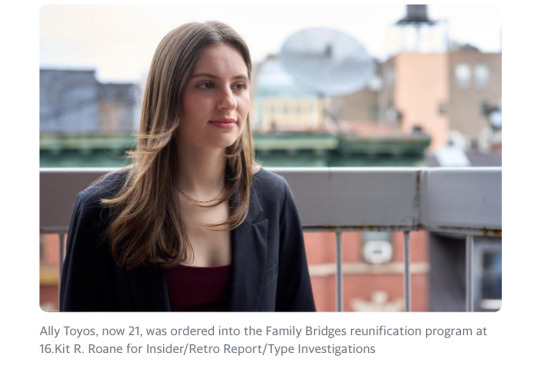
Ally Toyos was a 16-year-old in Kansas when she was taken from her mother five years ago. In an interview, she said she and her then 14-year-old sister tried defying the Family Bridges moratorium, telling Rand and his colleagues that their dad had abused them. (Toyos' mother said a court order prevented her from speaking with the press; Toyos' father didn't reply to interview requests.) Threats ensued, Toyos said. The girls were told that if they didn't comply, they could be separated, sent to wilderness camps, committed to psychiatric facilities, and cut off from their mom for the rest of their childhoods, according to Toyos.
Much of the Family Bridges workshop involves watching and discussing videos, program documents show. One of them, "Welcome Back, Pluto," tells the fictional story of a petulant teen who scorns her father. "If you're alienated, like Emily, you might get mad when others don't take your complaints seriously," a female narrator says. In time, however, Emily "learned to see things more clearly." She realized her complaints were "exaggerated," the narrator explains, and "sounded just like her mother's."
According to the video, which was scripted by Richard Warshak, a psychologist who helped develop Family Bridges, some children who steadfastly reject a parent "suffer for the rest of their lives."
Other materials warn children against trusting their memories. Toyos, whose workshop took place at the C'mon Inn in Bozeman, Montana, said she was shown a 2013 TED Talk by Elizabeth Loftus, a psychologist who developed the idea that memory is malleable and who has served as a defense witness in high-profile trials, including Harvey Weinstein's. Memories are often contaminated by outside influences, Loftus warns in the talk, which leads to false accusations that can ruin lives.
Insider and Type spoke with or reviewed statements by 17 youths ordered into Family Bridges, Turning Points, or other reunification programs. Their accounts of the workshops were broadly similar. Hannah Rodriguez, then a 16-year-old living in Tampa, Florida, said her workshop, in 2016, was held at Linda Gottlieb's home in New York's Hudson Valley. Gottlieb, the author of a book on parental alienation syndrome, had founded Turning Points about two years earlier. Rodriguez said Gottlieb's office was right off the living room, where her husband spent his time in a recliner. Every day, Rodriguez could see him and hear his TV shows, she said.
Rodriguez, Toyos, and several other former participants said the workshops plunged them into depression.
In spring 2022, one 13-year-old girl got so distressed during a session with Gottlieb at a hotel that she banged on a wall and screamed for help, court papers show. Someone called the police, who brought her to a hospital for a psychiatric evaluation. "I just want my mom," the girl said, according to hospital records, but under the court order she couldn't call her. She was held at the hospital for three days.
In a written statement that Montes said he later dictated to her, Robert said he became suicidal. "The only thing that stopped me from throwing myself off the balcony was the 24/7 surveillance," the statement reads. "I never thought so many people would be that horrible, controlling, and manipulative towards little kids."
At the end of the workshop, Robert went home with Winenger and had "horrible, weird depressive anxiety episodes," according to the statement. In early February, he was admitted to the psychiatric ward of a children's hospital, according to court records.
Repeated emails to Rand were met with an auto-response saying he was "on sabbatical." The psychologist managing Family Bridges in his absence, Yvonne Parnell, declined interview requests, as did Gottlieb. Gottlieb forwarded Insider's queries to a lawyer, Brian Ludmer, but Ludmer said he couldn't speak for her. Neither Parnell nor Gottlieb replied to detailed written questions.
Lynn Steinberg said her program One Family at a Time, based in Los Angeles, has treated some 50 families over the past eight years. A family therapist, she's the author of "You're Not Crazy: Overcoming Parent/Child Alienation." She was the only program director who agreed to talk.
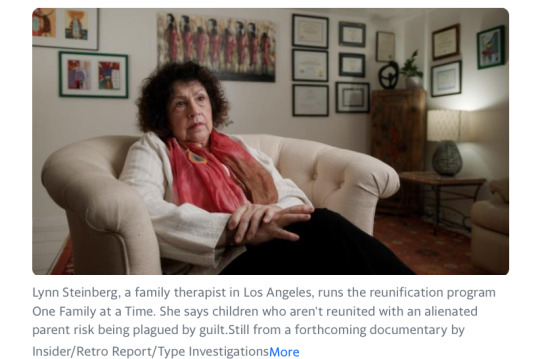
She said she begins each workshop by listening to the children and taking down every accusation they make; she then works to achieve "an agreement between parent and child." After those conversations, she said, the children are dramatically transformed. They apologize and cry, she said; they kiss and embrace the parent they'd rejected, even sitting in the parent's lap. They're eager to make up for lost time, she said, and can't wait to see long-lost kin.
Daniel Barrozo, of Chino, California, said Steinberg's workshop was a "tremendous help" to him and his daughter in 2021. Steinberg successfully challenged his daughter's misperceptions about him, he said. When Steinberg asked her what he'd done wrong and what she hated about him, his daughter simply looked down and cried, he said. "The whole time, she had nothing to say, because Mom was the one speaking for her," he said. Now, he said, his relationship with his daughter is stronger than ever.
Steinberg said her own mother alienated her from her father, a realization she reached only after his death. She called her ex-husband an alienator, too, saying her adult daughters reject her to this day. She regrets that they didn't get help from a program like hers.
Left untreated, alienated children "fail at relationships" and risk developing eating disorders, drug addiction, depression, gender dysphoria, and other ills, Steinberg said, citing her clinical experience.
But an increasing number of scholars are criticizing the programs. Jean Mercer, an emeritus professor of psychology at Stockton University, is the author of recent papers on parental alienation. One examined six reunification programs, including Family Bridges and Turning Points, and found that the research evidence supporting the effectiveness of the programs "has few strengths and many weaknesses." For another paper, Mercer reviewed the scholarship on the programs and statements from five youths who'd attended them. She found that the programs "may contain elements of psychological abuse."
Another study, by Michael Saini of the University of Toronto, examined 58 empirical papers on alienation and its treatments and found the body of research "methodologically weak." While some divorcing parents exhibited "alienating behaviors" and some children rejected a parent, the nexus between those phenomena hadn't been proved, Saini found. Moreover, he found the studies hadn't shown that interventions worked.
Following the workshop, the programs commonly assign children to a specially trained aftercare therapist. Meanwhile, the exiled parent undergoes reeducation.
Insider obtained audio of a call last year between Gottlieb and the mother of a 14-year-old girl and a 12-year-old boy in Turning Points. "I think what you did is criminal," says Gottlieb, who, like Steinberg, has publicly stated that her own mother alienated her from her father. There was "no reason" the children shouldn't have a relationship with their father, Gottlieb says in the recording, and "you have failed miserably to require it."
"That's alienation," she says. "That is what you are guilty of, and it's child abuse." For the children's sake, the woman must "make amends," Gottlieb says. Otherwise, "I will recommend extending the no-contact period until they're 18."
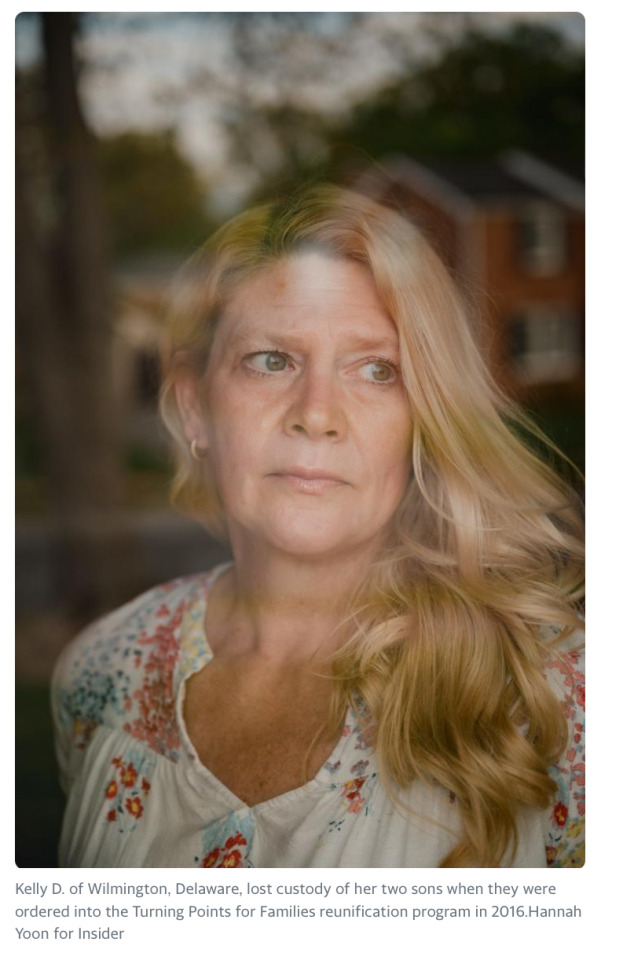
Insider and Type interviewed 12 mothers whose children were sent to Turning Points, many of whom said Gottlieb rebuked them over the phone and in emails. Most said they were required to write letters to the kids praising their fathers and submit them to Gottlieb for approval.
In early November 2016, Gottlieb told Kelly D. — Ashton and O.'s mother — that her letters contained superfluous details and secret messages and needed to be redone. In the end, Kelly submitted several drafts for each of her sons, all of which Gottlieb rejected.
"She sets a bar," Kelly said. "You try to reach the bar. She sets the bar higher."
Judge Ostroski had ordered Kelly to find a therapist "acceptable to Ms. Gottlieb" who would help her support Michael's relationship with the children. From a list provided by the Delaware Family Court, Kelly chose a psychologist, William Northey. But Gottlieb warned in an email, "I cannot approve him before I speak with him about his specialized knowledge of alienation."
The conversation went poorly. Gottlieb considered Northey unacceptable, she later testified, and Northey found fault with Gottlieb, too. He sent her a letter, reviewed by Insider, criticizing her for calling Kelly a "sociopath" and for using the phrase "parental alienation syndrome," which, he wrote, "is not a recognized diagnostic term."
Meanwhile, Gottlieb was making demands of Ashton and O. Shortly after they returned from New York, according to an email to both parents obtained by Insider, Gottlieb determined that they needed to transfer schools immediately, as their current schools had "actively undermined" their relationship with their dad.
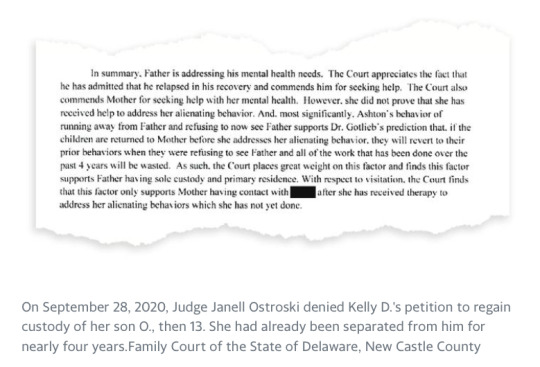
She sought custody of O., too. But in September 2020, Ostroski found that Kelly still hadn't been properly treated for her alienating tendencies and denied her petition.
For now, even visits were too risky, Ostroski concluded.
"Ashton's behavior of running away from Father and refusing to now see Father supports Gottlieb's prediction that, if the children are returned to Mother before she addresses her alienating behavior, they will revert to their prior behaviors when they were refusing to see Father and all of the work that has been done over the past 4 years will be wasted," Ostroski wrote in the ruling.
'Junk science'
In June 2010, more than a thousand mental-health practitioners, lawyers, and judges gathered at the Sheraton in downtown Denver for the annual conference of the Association of Family and Conciliation Courts, which unites players in the child-custody field from around the world. The theme that year was "Traversing the Trail of Alienation," and over four days the condition was discussed in more than 30 sessions. Participants could learn how to spot an alienating parent, when it was best to defy a child's wishes, and what might help an alienated child heal.
The event signified a remarkable embrace of an idea whose author had been consumed by scandal and tragedy just a short time earlier.
In the late 1990s, critics of Gardner's dealt a powerful blow to his credibility by unearthing writings in which he'd defended pedophilia.
"Sexual activities between an adult and a child are an ancient tradition," he wrote in a 1992 book.
As a product of Western culture, he viewed pedophilia as reprehensible, he wrote, but it may not be "psychologically detrimental" in other cultures. The following year, in a journal article, Gardner argued that from an evolutionary standpoint, children benefited from being "drawn into sexual encounters," since these experiences steered them toward early reproduction. "The Draconian punishments meted out to pedophilics go far beyond what I consider to be the gravity of the crime," he wrote in 1991 in "Sex Abuse Hysteria: Salem Witch Trials Revisited."
In May 2003, at age 72, Gardner dosed himself with painkillers and stabbed himself to death. His son told reporters he was driven to suicide by chronic pain that had recently worsened.
In the assessments of his life that followed, Gardner's work was lambasted by prominent psychiatrists, including Dr. Paul Fink, a past president of the American Psychiatric Association. "This is junk science," Fink told Newsday in July 2003. "He invented a concept and talked about it as if it were proven science. It's not."
The theory could have died with Gardner. Instead, it gained ground.
In 2001, Richard Warshak, a clinical professor of psychology at the University of Texas Southwestern Medical Center, published "Divorce Poison: Protecting the Parent/Child Bond From a Vindictive Ex." The book, released by HarperCollins, brought parental alienation theory to a wider audience — and made it more palatable. Unlike Gardner, Warshak spoke of alienation in gender-neutral terms, saying many fathers were programmers, too, and he likened the no-contact period between children and their preferred parent to study abroad.
Warshak started leading workshops for Family Bridges around 2005 and eventually became its unofficial spokesman, a role in which he excelled. In 2010, he appeared in "Welcome Back, Pluto" and published an influential article about Family Bridges in the AFCC journal.
In that study, Warshak reported on outcomes for the 23 children he'd worked with in the program so far. During the four-day workshop, 22 of them recovered a "positive relationship" with their rejected parent, he observed, including recalcitrant teens.
After the workshop, however, four children regressed, Warshak wrote, following what he called "premature" contact with their preferred parent. The program worked best, he said, when this contact was blocked "for an extended period of time." Warshak didn't respond to interview requests.
Meanwhile, another Gardner successor, Dr. William Bernet, a professor of psychiatry at Vanderbilt University, was working to push alienation theory forward. He submitted a proposal to the American Psychiatric Association to include "parental alienation disorder" in the next version of its Diagnostic and Statistical Manual of Mental Disorders, or DSM, and authored a scholarly article making the case for inclusion. He submitted a similar application to the World Health Organization, which was revising its International Classification of Diseases.
Bernet declined a request for an interview. But in a 2010 book, he wrote that since alienation scholarship had advanced in the wake of Gardner's death, "there is no need now to dwell on the details of what Richard Gardner did or said or wrote."
At the AFCC's conference in Denver in June 2010, Warshak was given a platform to discuss his Family Bridges paper, as was Bernet, to describe his DSM bid. Other presenters staked out a more moderate stance, arguing that while alienation was a pervasive problem, there was insufficient research to support construing it as a mental illness or ordering extreme interventions.
A few alienation opponents presented, including Joan Meier. But she said she flew home to Washington in tears.
"Everywhere I turned, alienation was the coin of the realm," she said.
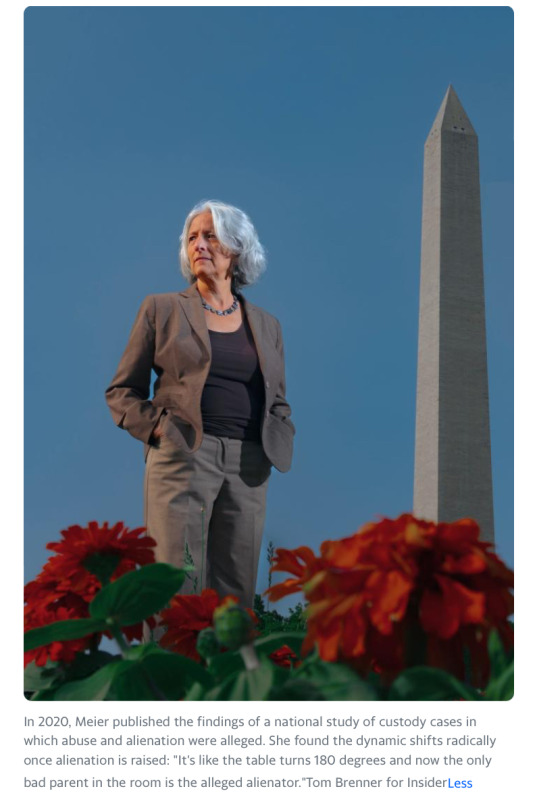
She set out to design a study that would document how women who alleged abuse were treated in family courts nationwide — especially when alienation was raised. The Justice Department supported the project with a grant of $500,000.
In 2013, the new edition of the DSM was released with no mention of parental alienation. And in 2020, the World Health Organization ruled that parental alienation was "not a health care term" and lacked "evidence-based" treatments.
Bernet and his colleagues simply regrouped. In court, they started calling alienation a "dynamic" or a "phenomenon" rather than an illness, which appeared to satisfy some judges. And Bernet incorporated the nonprofit Parental Alienation Study Group, a coalition of parents, lawyers, and therapists who collaborated on cases and research. Rand, Gottlieb, and Steinberg joined, along with hundreds of other mental-health practitioners involved in custody work. Many, like Steinberg and Gottlieb, claimed to have experienced alienation themselves.
Meier assembled her own research team, comprising a statistician, three social scientists, and two assistants, to conduct her large-scale study. In January 2020, just weeks before the WHO decision, the results were published in the Journal of Social Welfare and Family Law.
The stark findings shocked even her.
Most trial-court rulings in custody cases are unpublished, but Meier's team identified 15,000 rulings involving abuse or alienation that were published electronically from 2005 to 2014. After winnowing that dataset to cases in which the only parties were two warring parents — not, for example, a child welfare agency — the team was left with 4,300 rulings. There were nearly 2,200 cases in which a mother had accused her ex of spousal or child abuse, and in 10% of these, the father had fought back with an alienation claim.
In general, judges were hesitant to credit mothers' abuse claims. When alienation wasn't raised, judges credited these claims 41% of the time, Meier found, and 26% of the time, mothers lost primary custody.
For the 222 mothers whose spouses accused them of alienation, the picture was even grimmer. Women who alleged abuse and whose husbands accused them of alienation lost custody half the time — twice as often as women who weren't accused of alienation.
To Meier, one of the study's most staggering findings was how rarely mothers branded with the scarlet "A" were believed. In cases where mothers alleged child physical abuse and fathers cross-claimed alienation, judges credited mothers a mere 18% of the time, she found. And in the 51 cases where mothers alleged child sexual abuse and fathers claimed alienation, all but one mother was disbelieved.
For a father accused of child molestation, Meier concluded, "alienation is a complete trump card."
'The whole world is watching'
In January 2022, three months after losing her children, Montes chanced upon a sickening discovery.
In a cloud storage account she'd once shared with Winenger, she said, she found thousands of his photos and videos, including explicit images of their three shared children. She loaded them onto a thumb drive for the San Diego County Sheriff's Department, whose investigation into Winenger had never closed.
Within days, Winenger was arrested. He was soon charged with 19 felonies, including possession of child pornography and 14 counts of committing forcible lewd acts against a child, Robert.
He pleaded not guilty and was released on bail, his access to the children suspended. Because of the no-contact order he'd previously obtained against Montes, the children landed in a county shelter. Winenger's defense attorney, Patrick Clancy, declined to comment on Winenger's behalf, saying he doesn't try his cases in the press.
Suddenly, the custody dispute was transferred to juvenile dependency court, which meant Ratekin was no longer presiding. The new judge ordered the kids into their mother's care while the case was pending. On February 18, they came home.
At first, Montes said, the two youngest children were so scared of being taken again that they couldn't sleep in their rooms. She set up a big mattress on her bedroom floor.
Meanwhile, Joan Meier was using her research to make inroads with policymakers.
She'd worked with colleagues to draft a federal law that would incentivize states to protect children from abusers during custody disputes. They named the bill Kayden's Law, after a girl in Pennsylvania whose father murdered her during a court-ordered visit. During negotiations over reauthorization of the Violence Against Women Act, the child's congressional representative, Brian Fitzpatrick, got Kayden's Law in.
The legislation, signed into law on March 15, 2022, sets aside up to $5 million a year for grants to states if, among other measures, they mandate training for custody judges on abuse and trauma and prohibit them from ordering treatments that cut children off from a parent to whom they are attached. If enough states comply, the law could spell the end of the reunification programs.
Last summer, California was the first state to consider such a bill. It was introduced by state Sen. Susan Rubio of Los Angeles County, a survivor of domestic violence herself, after she heard from mothers who'd been accused of alienation and children who'd been sent to reunification programs.
Rubio's bill set off a battle that has since spread to statehouses around the country. Steinberg, the alienation therapist from Los Angeles, was a vocal opponent, arguing that men would be rendered powerless against false accusations. She was joined by fathers' rights groups and by the Parental Alienation Study Group, which was simultaneously pushing hard to discredit Meier's study. (Two prominent members of the group authored a studyconcluding that her findings could not be replicated, which Meier then rebutted.) After Rubio's bill passed the assembly unanimously last August, she was forced to withdraw it in the face of intense opposition from state judges over the training mandate.
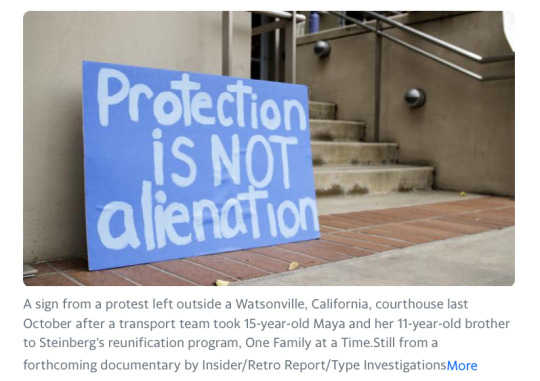
Then, last October, the momentum shifted. That's when Maya, the 15-year-old from Santa Cruz, told a custody judge that her mother had abused her and her brother. The judge, Rebecca Connolly, didn't believe her and ordered the children into Steinberg's program, cutting off contact with their father. The graphic video of the children being seized on October 20 was quickly viewed millions of times.
In response to an interview request, an officer of the Santa Cruz County Superior Court said Connolly could not speak about pending cases. Maya's mother has denied the abuse claims in court. Her lawyer, Heidi Simonson, declined an interview, citing court orders pertaining to "privacy and confidentiality."
On the heels of the viral video, a coalition of activists — many of them mothers accused of alienation — organized protests around the country. The first took place October 28 outside the courthouse where Maya had just testified. Standing on concrete risers and facing the building, a pack of Maya's friends demanded her return. "The whole world is watching!" they shouted. Protests also erupted in Michigan, Kansas, and Utah.
Rubio introduced a new bill, with modified judicial training requirements, in February. A similar bill passed both chambers of the Colorado legislature in April. One in Montana died in committee; its sponsor, Sen. Theresa Manzella, said she was up against a "deliberate distribution of misinformation" by opponents, including attorneys who use parental alienation as a legal tactic.
Montes said she's "cautiously optimistic" about Winenger's criminal trial, set to begin in June, and she hopes for an imminent victory in her custody case. Five years of legal bills have left her in debt and on food stamps, she said, but she considers herself lucky all the same. Almost every day, she talks to mothers who remain severed from their children.
Mothers like Kelly D., whose children were sent to Linda Gottlieb's reunification program in New York.
Kelly last saw her younger son, O., early on a Monday morning. It was a warm, sunny day, and she dropped him off at his best friend's house so they could shoot baskets before school. She hugged him, told him she loved him, and said she'd pick him up in the afternoon. Then she drove to court for a hearing.
That was six years, six months, and 24 days ago.
The reporting for this story is part of a forthcoming documentary from Insider, Retro Report, and Type Investigations.
If you are experiencing domestic abuse, you can call the National Domestic Violence hotline at 1-800-799-7233.
Read the original article on Insider
#USA#family courts#Child custody#abusers making themselves the victims#Parental alienation#Children being abused after the courts removed them from their mothers#Family Bridges#Dr. Richard Gardner#Reeducating children#Threat therapy#Long article#State sponsored gaslighting of children#Lynn Steinberg#One Family At A Time#Pathologizing abuse victims
844 notes
·
View notes
Text
words I think we should ban from the internet unless you can pass a test to prove you know what it means and will use it correctly: gaslight, queerbait, nepotism
#there are definitely others i think these are probably just the biggest three offenders#people will be like [one character has a different understanding of a situation] 'they are gaslighting!'#or [male celebrity wears nail polish] 'he is queerbaiting!'#or [celebrity had a middle class upbringing to rando parents] 'they're a nepo baby!'#words have meanings!! for a reason!!!#talking
282 notes
·
View notes
Note
Hi I was wondering how do you deal with a toxic family member? How do you handle situations in which they are manipulative and gaslighting you?
Validate your own emotions and experiences
Practice emotional differentiation. Prioritize your own feelings and goals
Learn the psychology behind guilt-tripping, shaming, and people-pleasing & how it's used to manipulate/gaslight children of narcissistic & other types of emotionally immature parents
Implement the "grey rocking" technique during conversations (be "boring' and emotionally flat; don't give them the emotional reaction they crave)
Go as low contact as humanely possible (no contact is the best option). Never initiate a conversation unless its absolutely necessary (logistical issue, emergency, etc. if needed)
Keep them on an information diet. Don't tell them anything about your life that is not vital for them to know
Don't try to change their minds. Just say "You're right," and disengage
Set boundaries on conversation topics/them criticizing your character. Say "I'm not engaging in this conversation." Stop replying, hang up the phone, or walk away
Live your life with them out of sight, out of mind as much as possible. You deserve to live in peace and be happy, no matter what these toxic family members say
Hope this helps xx
#toxic household#toxic family#narcissistic behavior#gaslighting#adult children of emotionally immature parents#emotionally immature parents#emotional regulation#emotional abuse#higher self#personal growth#trauma healing#healing journey#trauma recovery#femmefatalevibe#q/a
351 notes
·
View notes
Text

#toxic parents#narcissism#enablers#flying monkeys#maternal narcissism#gaslighting#manipulation#emotional abuse#guilt tripping#shame
302 notes
·
View notes
Text
This is for everyone who feels like they're going crazy trying to figure out if they were/are being abused.
Not every insult sounds like 'your stupid' or 'your ugly'
Abusers may not say 'your just crazy' when they try to gaslight you. They may say things along the lines of
'you dont even try'
'if you were smarter you would ____'
'why can't you be normal?'
When trying to insult you
They may say something along the lines of
'Well I'm sorry that's what you *thought* I did'
'you need a therapist your mental illness is changing your perception'
'why do you argue everything'
When they try to gaslight you
Lots of abusers try to be subtle about how they insult and manipulate you so they can hide behind plausible deniability.
"we weren't trying to insult/manipulate you we'd *never* do that! I can't believe this is what you think of us. That just shows that *you're* in the wrong. You need to apologize"
Sound familiar?
They're *trying* to make you to feel crazy, it lets them keep getting away with it. And if you think 'they wouldn't do that *on purpose*, it must be unconscious' they want you to think that to. It also doesn't excuse their behavior even if it is unconscious
#emotional abuse#trauma#child abuse#toxic parents#childhood trauma#gaslighting#actuallytraumatized#phycological abuse#emotionally immature parents
317 notes
·
View notes
Text
So, it's been a while since I posted something, especially an update on how things are going at home.
I am happy to report that the donations I've received are extremely helpful and I'm grateful for what you guys have sent in thus far. Like, words cannot describe how thankful I am for it..
However.
Things aren't getting better, it feels like.
Sure, my parents have a fucking understanding now of a lot of things, but, that doesn't change the fact they still don't trust me to make the right decisions, be an adult, take care of myself, work and make money, and be better and more capable than they think I am.
They think that, because of how my brain works- how I think, how I handle things- that I cannot figure things out on my own.
That I cant figure out how to live life somewhere else.
Work a job that pays well and allows me to have a nice place.
How am I supposed to know that when I've been living a sheltered goddamned life practically my whole fucking life??
I feel like my dad sometimes acts like Mother Gothel from fucking Tangled-
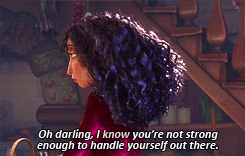
This shit in the gif alone is something that my dad has said to me--
And that's fucking gaslighting.
Now, my father could have the best intentions. He could be trying to motivate-
If it wasn't for the fact he's told me this shit for years and years that I don't have anyone out there besides the family in my house who would help me and want me to be and do my best without screwing me over. Who knows me and who knows what I'm like.
Which, by the way, is bullshit.
But, whatever.
My opinion on the matter is null and void at this point in his eyes.
So.
If you can, please- I'm begging--
I legitimately cannot stomach living in this place anymore. If anyone can donate to my GoFundMe, please do so. I'm so sick and tired of this shit.
#gofundme#link#please i need all the help i can get#spilling the tea#update#cw abusive parents#parental gaslighting#shut up kido
0 notes
Text
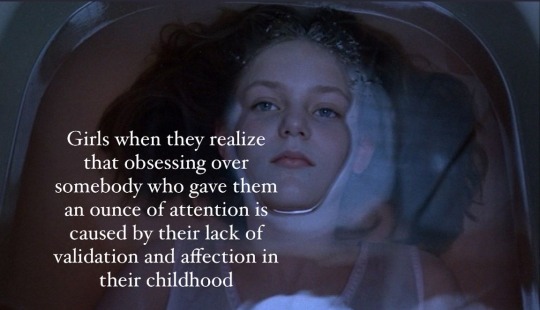
#coqeutte#lana del rey#hell is a teenage girl#the virgin suicides#cecilia lisbon#femcel#gaslight gatekeep girlboss#mitski#delusional#it girl#girlblogging#girlhood#girl interupted syndrome#delulu#this is a girlblog#vent#pink#lana del ray aka lizzy grant#parental issues#this is what makes us girls#female hysteria#mommy issues#daddy issues
2K notes
·
View notes
Text
Tips for Dysfunctional Family Girlies Part 2:
1) Get your basics straight. Education. Boundaries. Financial independence. Further breaking it down and linking it if you get proper education at some point you are bound to get an awareness of this world, if you are able to adapt and improvise yourself and develop your emotional intelligence and get your boundaries straight you will save yourself a lot of unnecessary drama and problems. Education (formal and informal) both will help you in gaining opportunities and if you are financially independent, you are holding the power to make your own decisions.
2) Develop thick skin. Your mom is calling you names. Slut, whore and what not. Your dad doesn't trust you and abuses you physically. So, what now? Are you going to let them define what you are or internalize the anger and use it as a fuel to become successful? Choice is yours.
3) They say you don't owe an explanation to anyone. Sorry to burst your little bubble. Actually you do. We live in a society and have relationships that we need to maintain for survival. This hyper independent stuff is only good to read. We have responsibilities that we need to fulfill. If you don't owe an explanation to anyone then don't cry about a closure from someone too. If you can live by this go ahead and practice it.
4) Stop isolating yourself. That's it. That's the point.
5) First kill the fear inside you. Being a rebel outside the house is no good. Be disciplined. Know how to manipulate your family members in your favor and if you can't just find the weak points and threaten. I know it's difficult to implement but you learn through trial and error. Plus something is better than nothing.
6) Stop glorifying people who treat you with kindness and love. That's the bare minimum. Just because you didn't get it served in a silver spoon doesn't mean it is not served in a silver spoon. People can have ulterior motives and even if they don't fix it in your brain that's normal. No rose colored glasses allowed.
7) Don't be afraid of indulging in your sexuality. No I am not saying go and have sex with people. I mean it in a deeper sense. Connect with the repressed sexual side and try to find healthy outlets. Don't dim yourself to fit in others'expectations or to ease someone's insecurity. Be unapologetic about your wants and desires. Know yourself. It's a powerful energy source if you know how to use it positively.
8) Cry, cry and cry. Wail like a child. No need to keep it all in. No need to act like a macho woman BUT only in front of your god or your belief system. Max in front of your truly trusted people.
9) Question everything as easily as breathing. Doubt every thing. Every action. Every person. What proof do you have to not doubt ? Stop giving benefit of doubts. Stop looking for excuses on how they could be good and instead look for ways in which they can harm you. That's your lottery to be poised and composed. It's just what it is.
10) Obsession. We have it in loads. That's natural to us. So the trick here is to be obsessive. Hella obsessive but about things, topics, goals, subjects, inanimate things,etc. God forbid but never be obsessive about a person. Not even over your dead body. Why? For that I need to make another detailed post I think.
#divine feminine#dark feminine energy#gaslight gatekeep girlboss#girlblogging#glow up#it girl#self care#self love#that girl#becoming that girl#level up journey#level up#dysfunctional family#toxic parents#trauma#trauma survivor#healing#self healing#self development#self improvement#that girl aesthetic#it girl aesthetic#pink pilates girl#pink pilates princess#mental health#wellness#becoming her#ash-says#dream girl#coquette
465 notes
·
View notes
Text
abusive parent (to the kid): You're FINE! Nobody did anything to you! It doesn't hurt, I barely touched you! Stop pretending! You're faking it for the attention! Stop Crying! Act Normal Or Else!
abusive parent (to everyone else): you see the kid's fine.
#psychological abuse#emotional gaslighting#hiding the abuse#covering up their own abuse#abusive parents#toxic parents#child abuse#emotional abuse#traumatic childhood#convincing abused children to fake being fine
204 notes
·
View notes
Text
My dad has daughter issues
#lena writes#hell is a teenage girl#obviously doctor you've never been a 13 year old girl#daddy issues#mommy issues#older men <3#dilfism#toxic people#toxic parents#toxic dad#girlblogging#gatekeep gaslight girlboss#just girly things#text#female insanity#female madness#female hysteria#i’m just a girl#i’m going insane#it’s getting bad again#its getting worse#depressing shit#tw depressing thoughts
73 notes
·
View notes